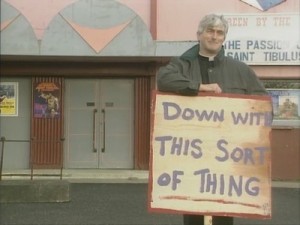CoA: 4850 Benefits Inapplicable to Modified Duty
So, dear readers, the week is almost over. Giving it a proper send-off is a blog post with all my beloved city and county readers in mind: the case of County of Nevada v. WCAB, David Lade.
The case is a pretty simple one – applicant was a Deputy Sheriff for Nevada County and sustained an injury to his shoulder in the line of duty. At that time of the injury, he was working the night shift, which entitled him to a 5% pay bonus (who wants to work nights, right?)
Well, he was placed on modified duty during the months leading up to his shoulder surgery, and that consisted of “light” duty during the day. The opinion is somewhat unclear as to whether it was light duty in the sense that the tasks put before Deputy Lade were not as strenuous as those that might be for a deputy on full duty, or if it was light duty simply because it was to be performed during the day light hours. (That one was a joke – a pun of sorts – it was less arduous work to be performed during day light hours.)
Now, during the time he was completely off work, he was paid his full pay, including his 5% differential for working the night shift. But, while on light duty, the 5% was NOT paid to him.
So, citing Labor Code section 4850, Deputy Lade advanced the argument that he was, in fact, entitled to the 5% pay bump because section 4850 served as a guarantee that he would see no decrease in his pay as a result of an industrial injury (in lieu of temporary disability benefits, of course).
When he was placed on light duty, he lost the 5% bump he was receiving before. Just for frame of reference, Nevada County’s Sheriff Deputies make about $4-$4.8k/mo for Deputy I, and $4.4-$5.4k per month for Deputy II, and that’s without overtime pay. So the 5% base is about $200 to $270 per month extra or $2,400 to $3,240 per year. Now, this may not seem like a lot to the big shot applicants’ attorneys out there, lighting their cigars with $100 bills while dipping their feet in gold-plated swimming pools filled with the tears of employers and insurers, but for the rest of us, that’s not money to be left on the table.
So, dear readers, what say you – does section 4850 apply to guarantee a shift differential/bonus that non-injured employees do not receive?
Well, the Court of Appeal, in a published decision, held that section 4850 does not apply to a decrease in earnings due to modified duty. Relying on a plain reading of the statute, the CoA held that 4850 applies only to an actual leave of absence. Assignment of modified duty, by definition, is not such a leave.
Apparently, as a matter of law, one cannot be on a leave of absence while actually back at work, even if working light duty on a different shift. In other words, no 5% bump.
Now, remember if you will, this humble blogger once had the pleasure to report to you another case on LC 4850, wherein the Court of Appeal found that benefits under 4850 go towards the Labor Code section 4656 cap on temporary disability benefits. So the two cases are in line with the same policy: certain public employees get full salary for a year in lieu of temporary disability benefits. But that’s what 4850 benefits are: super-duper temporary disability benefits, which you don’t really need (or get) if you’re back at work on modified duty.
